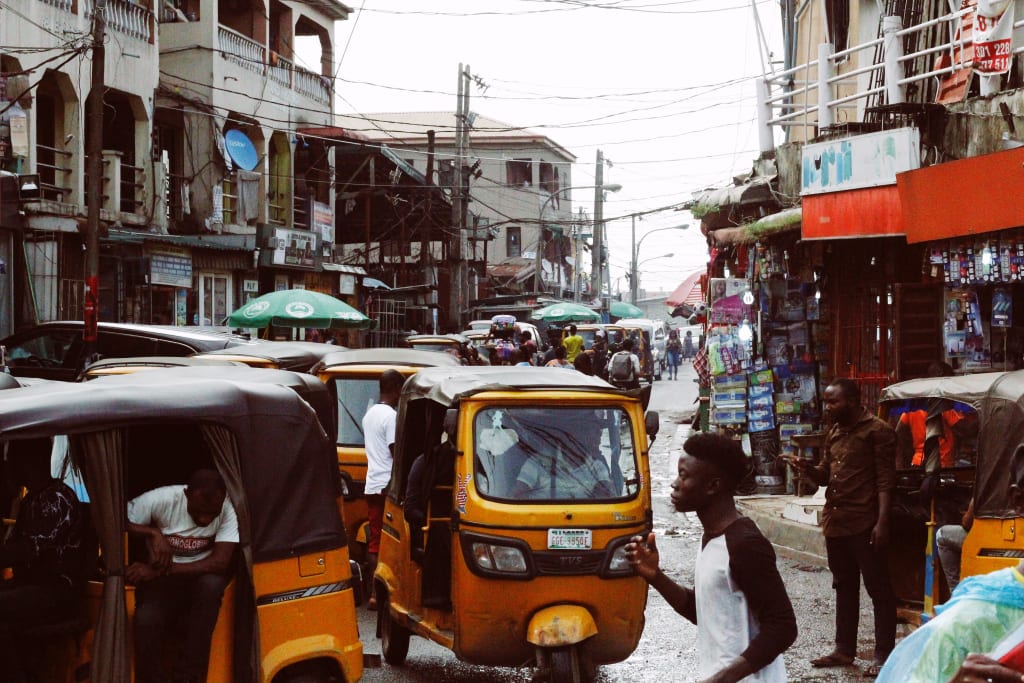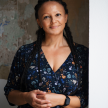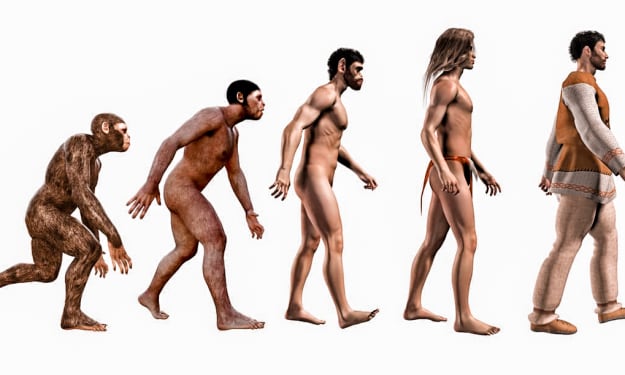An Object Can’t Be in 2 Places at the Same Time
And other inconvenient truths

On the plane back to Nigeria, I was equally excited and anxious. What would it be like? It had been 20 years since I’d last been to the country where I grew up.
During the long descent to Murtala Muhammed Airport, I saw a sprawling sea of rusty rooftops. Tropical dusk was setting in quickly, making it difficult to see any landmarks. There was less greenery than I remembered.
My memories of Lagos were over 20 years old. They were filled with bright colors, loud voices, spicy food, pulsating music, crowded spaces, and intense smells.
I remembered traffic jams, street vendors, long drives, heat, and humidity.
Sundays spent at Badagry Beach collecting shells, eating Mom’s fried chicken, soft drinks, and hard-boiled eggs, and bobbing in the waves for hours with my siblings. At night, I could still feel the phantom waves hitting my body.
Arrival at the airport was different. There used to be a chaotic baggage hall, confusing directions, crowds of people, and hours of waiting for suitcases. This time, I was out in 30 minutes.
Waiting for me outside was an older, frailer version of my father. Impeccably dressed as always, in dark suit pants, a beige blazer, tie, and suspenders, he looked dapper, way too warmly dressed for the climate, and genuinely happy to see me.
He’d been surprised but very pleased when I told him I was coming to visit over Christmas. Neither of us kids had made that trip for a long time.
It felt wonderful to see him again.
We stepped out into the warm night air, and the heat embraced me like a wet blanket. The city assaulted all my senses. I realized how much I'd missed this place.
Here were all the smells, the sounds, the crowds I remembered.
Cars honked, weaving in and out of traffic. Thick clouds of exhaust rose from older vehicles. Drivers trying to find a place to park and pick up families with far too many suitcases stopped in the middle of the street. Others honked and cursed angrily at them.
It was chaos, and I felt like I had come home.
Taxi drivers tried to get our attention to hustle us to their cars. Men from the north in their jalabiyas offered to exchange dollars or euros for naira.
They held thick wads of dirty bills, “Sah, sah, naira, naira. Better rates!”
The air felt like it was vibrating with energy.
Lagos always feels like that. You arrive, and in an instant, you feel a jolt of energy.
Maybe it’s because life in Nigeria is like a permanent near-death experience.
Everyone is always on the move. Always hustling, trying to survive in a relentless, hard world.
There’s no social security, no health insurance, no one but you to pick you up when you fall.
There’s money or no money. You either have it, or you want it.
The brutality of the struggle for survival is unimaginable to anyone living in the industrialized world. I got a glimpse of something similar in the U.S where I walked past the homeless encampments on the streets of San Francisco.
But Lagos is different; poverty is more common than wealth. Everyone is struggling to survive. Africa is only for the strong or the lucky.
I was glad my father had come to pick me up. I’ve become soft. I’ve no idea how I’d have managed on my own in the unfamiliar chaos.
Our driver found us in the bustling crowd and somehow managed to maneuver us out of the airport onto the Abeokuta Expressway.
While I was away, my father had moved to a new place in Ota. There he’d built a six-bedroom house on a large plot of land planted with papaya and banana trees.
In his mind, it made sense. All four of us would come to visit, fill the empty rooms, and bring life and activity to the house, just as we’d done as children. In reality, nobody came.
The futility of his hopes is reflected in the half-finished, huge mansion where he lives alone on the top floor. Below him, the bare walls of the first-floor bedrooms await completion.
Our toys, books, and childhood knickknacks sit around in dusty boxes, waiting to be unpacked. Slowly they succumb to time and humidity.
We arrived at the house after bouncing over large potholes for 20 minutes.
The moment we turned off the expressway, the world had become dark and bumpy. The infrastructure in the outskirts of Lagos is as poor as it was 20 years ago.
Mustafa, the security guard who lives in a small hut in the compound, rushed to open the gate and greet us.
There was no light. NEPA, the public power company that we children had christened “No Electric Power Again,” lived up to its name.
The inability of a nation with such vast resources to provide its citizens with the most basic amenities is disheartening. Instead, the wealthy elites retreat to gated communities in Leki or on Victoria Island. There they live a life that bears no resemblance to the daily lives of most people.
After all this time, nothing works. Electricity, water, roads, government, everything feels like it’s being operated for fun by little kids. Who gave up in the middle of the game because they got tired of it.
After a few moments, the generator sputtered to life, the light bulbs and the TV flickered on, and the ceiling fans began to sluggishly move the warm air.
Looking around the living room, I saw nothing familiar, the furniture, the decoration, everything was new. None of the things my mother had picked out had remained.
I don’t know what I’d expected. Perhaps I’d thought that my memories had been transplanted into these strange walls to welcome me back to my childhood.
But time moves on while we’re away. Surprisingly the world doesn’t revolve around us.
What remained of my past was Monika, the housemaid who was already with us when I left Nigeria. Every day she comes to clean the house, cook food for my father, and watch telenovelas with him.
Nigerians have a great fondness for overly dramatic stories. I’d seen my first Bollywood movie as a child in a crowded movie theater in Lagos. Not surprisingly, they also enjoy these endless South American dramas.
I’m so grateful that Monika is still here to take care of my father and tolerate his patriarchal manners and bossy attitude. He’s a sweet, stubborn man who’s easy to love but difficult to live with.
But if I’d met her in the street, I wouldn’t have recognized the young, thin woman I had known in the stately matron who greeted me enthusiastically. And I’m sure that she wouldn’t have recognized me either.
After all these years, all that holds us together is our relationship with my father. It’s a tenuous bond that I fear will break when my father leaves us.
Just as I fear losing my connection to Lagos and my youth when he’s gone.
I came to visit because I was worried.
He’d stopped his annual visits to Europe. The last time I’d seen him was 3 years ago. He’d been in Vienna for a couple of months, and I’d noticed that he’d become a frail old gentleman who walked in a shuffle.
I felt he was much too young to be that old and wanted to see how he was doing in Nigeria.
Staying with him, I quickly discovered that there’s nothing wrong with him except that he’s completely immobile.
He spends his days in an armchair, reading stacks of newspapers Mustafa fetches, dozing, and watching TV.
His body has aged before his time from immobility.
Of course, there’s nowhere to go when you live in Ota. Outside the wall, with the broken glass on top, there’s nothing. There are no stores, no movie theaters, no gyms, no cafes, no restaurants. There are bumpy streets without sidewalks and other houses.
He’s retired. Other people do his errands, and he doesn’t feel like slogging through the insane traffic to visit old friends or relatives. So he sits at home in his empty house and waits for time to pass.
It’s a strange lifestyle — only possible for those with money. Everyone else toils until the day they die or their children earn enough to support them.
I never realized how monotonous my father’s life has become. My elder brother and I pay for this luxurious monotony, but in return, we don’t have time to spend with him.
In my memory, my father is still the world traveler, the storyteller who entertains my friends and me with anecdotes from his trips. He’s the tireless optimist who always has new business ideas. Who always sees an opportunity and makes plans.
Not this old man who sits in a chair all day with nothing to do and no one to talk to.
His voice is the same, but it comes from a much smaller version of him.
Seeing his body shrink from lack of use made me better understand the need for activity.
His withering away in his chair made me sign up at a gym and start lifting weights. I want to believe that we have a say on how quickly our body ages.
Most lives don’t turn out as we imagine. My father will forever wait for the 4 of us to visit at the same time.
With large families of our own.
With the grandchildren he keeps asking for.
During the short weeks I spent with him that Christmas, I dearly missed the consistent water pressure in my shower, the reliable power supply, my high-speed internet, the cafés, my friends, and the orderly calm of Vienna’s streets.
Back here in Vienna, I miss my father, the colors, the food, and the feeling of being alive.
I want to hear the cicadas, the voices, the laughter and feel the warm sands between my toes.
But unfortunately, we can’t be in two places at the same time.
About the Creator
Ronke Babajide
Woman in IT, Natural Scientist, Life Coach, Speaker, Podcaster, Writer, Founder
Host of the “Women in Technology Spotlight” https://bit.ly/3rXvHvG
Creator of "The Queen Bee Hive" https://thequeenbeehive.net/en/






Comments
There are no comments for this story
Be the first to respond and start the conversation.